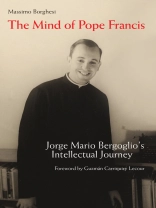A commonly held impression is that Pope Francis is a compassionate shepherd and determined leader but that he lacks the intellectual depth of his recent predecessors. Massimo Borghesi’s The Mind of Pope Francis: Jorge Mario Bergoglio’s Intellectual Journey dismantles that image.
Borghesi recounts and analyzes, for the first time, Bergoglio’s intellectual formation, exploring the philosophical, theological, and spiritual principles that support the profound vision at the heart of this pope’s teaching and ministry. Central to that vision is the church as a coincidentia oppositorum, holding together what might seem to be opposing and irreconcilable realities. Among his guiding lights have been the Jesuit saints, Ignatius and Peter Faber; philosophers Gaston Fessard, Romano Guardini, and Alberto Methol Ferrer; and theologians Henri de Lubac and Hans Urs von Balthasar.
Recognizing how these various strands have come together to shape the mind and heart of Jorge Mario Bergoglio offers essential insights into who he is and the way he is leading the church. Notably, this groundbreaking book is informed by four interviews provided to the author, via audio recordings, by the pope himself on his own intellectual formation, major portions of which are published here for the first time.
Tabella dei contenuti
Contents
Foreword by Guzmán Carriquiry Lecour
Introduction
1. A Horizon Marked by Profound Contrasts
At the Origins of a System of Thought: Gaston Fessard and the Theology of “As If”
Juan Domingo Perón and the Church
The Unity of Universal and Particular, Center and Periphery: The Lesson of Amelia Podetti
City of God and Earthly City: The Relevance of Augustine
The
Pueblo Fiel as Theological Source
2. A Philosophy of Polarity 57
The Society of Jesus as Synthesis of Oppositions
Jesuits and Dialectical Thought: Przywara, de Lubac, Fessard
The Dialectical Thomism of Alberto Methol Ferré
3. The Theory of Polar Opposition: Bergoglio and Romano Guardini
Doctoral Thesis on Guardini
Principles and Polarity: Similarities between Bergoglio and Guardini
Polar Opposition and the Common Good:
Sineidetic Thought
Power, Nature, Technology: Guardini in
Laudato Si’
4. Church and Modernity: Methol Ferré and the Catholic
Risorgimento
in Latin America
Vatican II as the Overcoming of the Reformation and the Enlightenment
From Medellín to Puebla: The Latin American Catholic
Risorgimento
Catholicism and Modernity: The Lesson of Augusto Del Noce
Libertine Atheism and the Critique of the Opulent Society
5. A World without Bonds: The Primacy of the Economy in the Era of Globalization
Globalization and the Latin American
Patria Grande: Methol Ferré and Bergoglio
Pope Benedict XVI’s
Caritas in Veritate
Evangelii Gaudium’s Critique of Inequality
6. At the School of Saint Ignatius: Life as Witness
Narrative Thought and
Theologia Crucis: An Ignatian Tension
Michel de Certeau’s Biography of Peter Faber
Being and the Unity of the Beautiful, the Good, and the True: Bergoglio and Hans Urs von Balthasar
7. Christianity and the Contemporary World
Mercy and Truth:
Amoris Laetitia and the Morenita’s Gaze
Encounter as “Beginning”: The New Balance between
Kerygma and Morality
Aparecida: The Christian Style in the Twenty-First Century
Index
Circa l’autore
Massimo Borghesi is professor of moral philosophy at the University of Perugia. He is the author of several books, including The Mind of Pope Francis: Jorge Mario Bergoglio’s Intellectual Journey (Liturgical Press, 2018) and volumes on Augusto del Noce, Luigi Giussani, and political theology.







![Copertina di Brian Schrag & Julisa Rowe: Community Arts for God's Purposes [Chinese] 貼近神心意的社群藝術 Copertina di Brian Schrag & Julisa Rowe: Community Arts for God's Purposes [Chinese] 貼近神心意的社群藝術](https://static.worldofdigitals.com/thumb_webp/740/9781645083740.webp)




